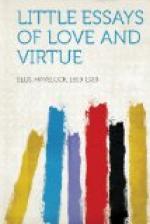to be so theoretically even when in practise it came
to allow great independence to the wife. Christianity,
although it allowed complete spiritual freedom to
the individual, introduced no fundamentally new theory
of the family, and, indeed, re-inforced the old theory
by regarding the family as a little church of which
the husband was the head. Just as Christ is the
head of the Church, St. Paul repeatedly asserted,
so the husband is the head of the wife; therefore,
as it was constantly argued during the Middle Ages,
a man is bound to rule his wife. St. Augustine,
the most influential of Christian Fathers, even said
that a wife should be proud to consider herself as
the servant of her husband, his
ancilla, a word
that had in it the suggestion of slave. That
was the underlying assumption throughout the Middle
Ages, for the Northern Germanic peoples, having always
been accustomed to wife-purchase before their conversion,
had found it quite easy to assimilate the Christian
view. Protestantism, even Puritanism with its
associations of spiritual revolt, so far from modifying
the accepted attitude, strengthened it, for they found
authority for all social organisation in the Bible,
and the Bible revealed an emphatic predominance of
the Jewish husband, who possessed essential rights
to which the wife had no claim. Milton, who had
the poet’s sensitiveness to the loveliness of
woman, and the lonely man’s feeling for the solace
of her society, was yet firmly assured of the husband’s
superiority over his wife. He has indeed furnished
the classical picture of it in Adam and Eve,
“He for God only, she
for God in him,”
and to that God she owed “subjection,”
even though she might qualify it by “sweet reluctant
amorous delay.” This was completely in harmony
with the legal position of the wife. As a subject
she was naturally in subjection; she owed her husband
the same loyalty as a subject owes the sovereign;
her disloyalty to him was termed a minor form of treason;
if she murdered him the crime was legally worse than
murder and she rendered herself liable to be burnt.
We see that all the influences on our civilisation,
religious and secular, southern and northern, have
combined to mould the underlying bony structure of
our family system in such a way that, however it may
appear softened and disguised on the surface, the
husband is the head and the wife subject to him.
We must not be supposed hereby to deny that the wife
has had much authority, many privileges, considerable
freedom, and in individual cases much opportunity
to domineer, whatever superiority custom or brute
strength may have given the husband. There are
henpecked husbands, it has been remarked, even in
aboriginal Australia. It is necessary to avoid
the error of those enthusiasts for the emancipation
of women who, out of their eager faith in the future
of women, used to describe her past as one of scarcely
mitigated servitude and hardship. If women had




